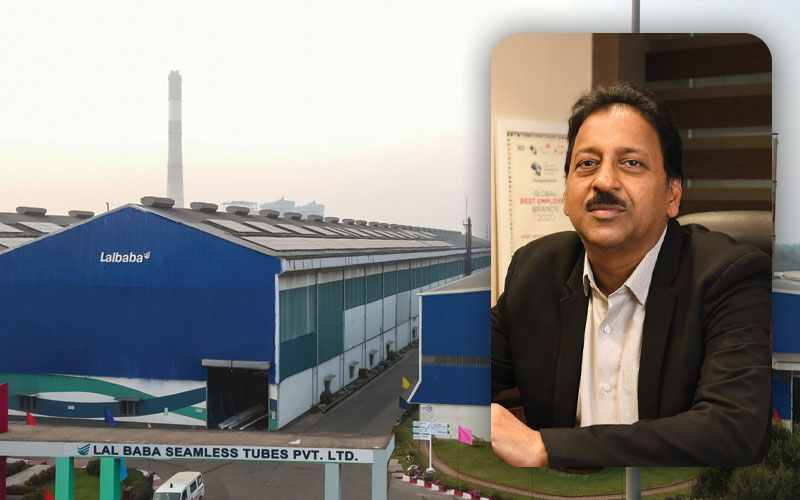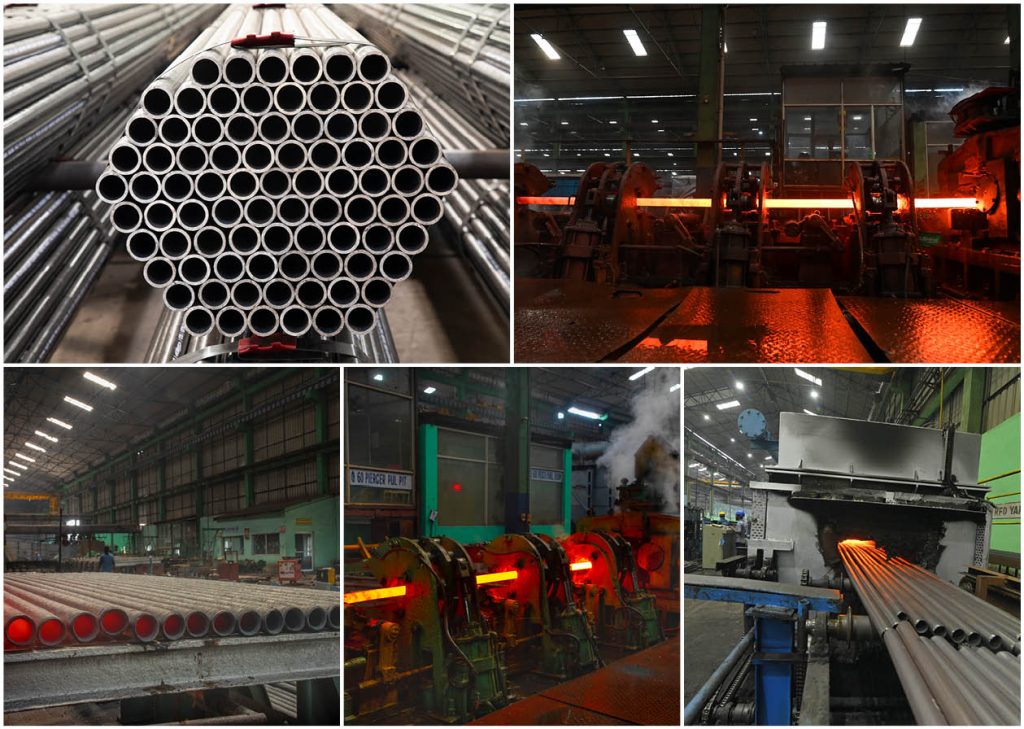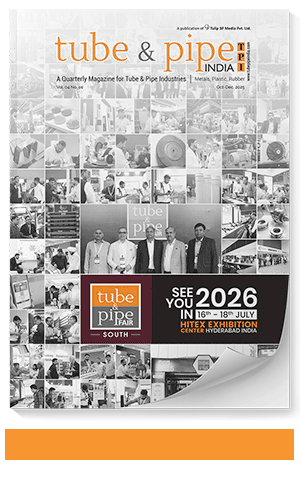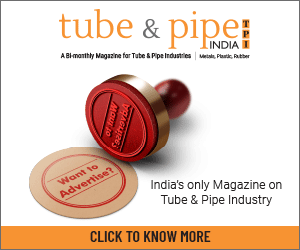Lalbaba Group is a diversified engineering company specializing in heavy engineering and critical manufacturing of a wide range of seamless tubes for various applications in the engineering and process industries, including oil, gas, and automotive sectors. Originally a micro-enterprise, the group has now established a presence in over 20 countries, gaining a reputation for quality and reliability. In an exclusive interview with Tube & Pipe India, Mr. Kishan Dhanuka, Managing Director, Lalbaba Group, discusses their remarkable journey and how they became the largest producer of cold drawn seamless tubes in the stainless steel segment in India.

Tube & Pipe India: How would you describe your company’s journey since its establishment?
Kishan Dhanuka: With over six decades of experience, the journey of Lalbaba Group has been nothing short of incredible, marked by both challenges and achievements at every turn. Founded in 1964, the company officially launched Lalbaba Seamless Tubes Private Limited (LBST) in 2009, establishing the first seamless pipe unit in Eastern India.
Since those early days, we have evolved into the largest producer of cold drawn seamless tubes in the country. While the journey has had its challenges, our unwavering commitment to innovation and quality has propelled us forward, transforming obstacles into opportunities for growth and advancement.
TPI: What elements have played a significant role in the success of your journey?
KD: The key elements of our successful journey include consistent focus on research and development, strategic partnerships, and adherence to global standards. Our emphasis on sustainable practices and adaptability to market changes have also contributed to its growth and industry reputation.
TPI: What is the annual capacity of the company in the stainless steel segment?
KD: With manufacturing facilities spread across 700,000 square feet in proximity to Haldia Port, the company has an installed capacity exceeding 72,000 MT per annum in cold drawn carbon steel & stainless steel seamless tubes.
TPI: In what ways do your stainless steel offerings stand out from those of your competitors?
KD: Our premium steel quality makes us stand out from the rest of our competitors. Each steel used in the manufacturing of our seamless pipes and tubes has been specifically curated with our own specification, being far more superior in terms of restricted chemical composition, inclusion ratings, and gas content, along with improved reduction ratios of steel bars. To guarantee inherent quality, we conduct additional Non-Destructive Testing (NDT) such as Ultrasonic Testing (UT). Our focus on high-quality rolled bars, which undergo rigorous quality checks, ensures exceptional durability and reliability in every product.
TPI: What special technologies are used to manufacture the SS product lines? Discuss about the infrastructure setup and your production capabilities for this segment?
KD: At LBST, we have adopted cutting-edge manufacturing technology for producing stainless steel seamless tubes and pipes.
Our manufacturing infrastructure offers flexibility in production parameters, and a wide range of machine options, allowing us to reach a monthly production capacity of 1,000 MT. Our advanced machineries include five piercing mills, capable of handling varying sizes, with our sizing mill accommodating tubes from 33.4 mm to 88.9 mm.
Additionally we have three pilger mills (30, 50A, and 50B) enabling a size reduction of pipes and tubes ranging from 19.05 mm-60.3 mm. We also utilize draw benches with capacities of 10, 20, 40, and 65 MT, handling sizes from 12.7 mm to 114.3 mm. To maintain the highest integrity and quality of tubes and pipes, we incorporate Non-Destructive Testing (NDT) machines, utilizing both Ultrasonic Testing (UT) and Eddy Current Testing (ECT). Our automatic cutting machines efficiently feed the piercing mill with a cycle time of less than 30 seconds, and our in-house peeling machines are capable of peeling thicknesses ranging from 0.5 mm to 2 mm.
In addition to our manufacturing excellence, we also have an in-house NABL-accredited laboratory equipped with all modern testing facilities to ensure the highest standards of quality and performance.

TPI: Please elaborate on the most recent innovation you have integrated into your manufacturing processes. What new products are you planning to launch within this category?
KD: We have recently implemented online solution annealing for HFS/pilger-routed material, immediately after the sizing mill. This innovation significantly reduces process time and costs while improving delivery efficiency. Additionally, we are also on the verge of developing multiple critical stainless steel grades, including 304H, 321, 347, and 316Ti, further expanding our product range to meet specialized industry demands.
TPI: Which industries currently utilize stainless steel tubes and pipes, and are there any emerging sectors you are exploring for future expansion?
KD: Currently, we are manufacturing SS products extensively for Indian railways for various engineering applications like air brake pipe, drainage pipe, double ferrule fittings for pneumatic systems of coaches and more. Looking ahead, we plan to expand our offerings into process pipelines, instrumentation tubing, equipment tubing, and automobile components for the respective industries.
Our clientele includes prominent organizations like Indian Railways, IndianOil (IOCL), Bharat Petroleum Corporation Ltd. (BPCL), Braithwaite & Co. Ltd. (BCL), among others.
Also Read: Purva Group: Defining Structures with Quality Steel Pipes & Tubes
TPI: What strategies do you employ to maintain brand visibility?
KD: To maintain brand visibility in our domain, we have relied on building strong interpersonal relationships with our clients and stakeholders. Participating in industry-specific trade shows, national & international exhibitions is a key part of our strategy, allowing us to showcase our expertise and engage directly with potential clients.
We also prioritize consistent communication through personalized interactions, regular client meetings and feedback sessions. These efforts help us understand the needs of our clients better and reinforce trust, ensuring that our brand remains top-of-mind for our partners and customers. As we mark 60 years in business, this year, we plan to implement a multi-channel approach including digital space & media collaboration for a cohesive brand experience.
TPI: Sustainability is increasingly important for businesses today. How is it in shaping your company’s identity, and what measures do you take to uphold it?
KD: Our company is fully aware of its responsibilities as a responsible manufacturing company and complying with the highest industry standards, like ISO 140001:2015. Over the past 2 to 3 years, we have made targeted investments to align our manufacturing processes with environmental goals.
We have invested in a solar-powered plant with a capacity of 2,500 KWP in Haldia, resulting in an annual carbon emissions reduction of 2,522.5 tons. Additionally, we have installed induction-based heating furnace systems at both our Haldia and Uluberia plants, eliminating the use of oil-fired heating systems across all our facilities, except in emergencies. Furthermore, we have initiated large-scale plantation efforts in Haldia to further enhance our environmental commitment.
TPI: What is your company’s vision over the next five years and how would you realize this vision?
KD: Our vision for the next five years is to provide comprehensive engineering solutions with agility, positioning ourselves as the top choice for our customers. We aim to achieve operational excellence through advanced tools and technology, focusing on improved data and document management. Additionally, we aspire to be recognized as the most rewarding workplace in the industry.
We plan to implement several strategic initiatives such as investing in advanced technology to improve data management and streamline operations. This will not only help us make faster decisions but also improve efficiency. Strengthening customer relationships is another essential component. This is achieved by understanding the evolving needs of the clients and delivering customized solutions.
Another key focus is to foster a culture of continuous learning through our dedicated training and development center, Gurukul, which is designed to upskill our team. We also prioritize transparency, collaboration, and leading by example to create a motivating and inclusive workplace.

We have three pilger mills (30, 50A, and 50B) enabling a size reduction of pipes and tubes ranging from 19.05 mm-60.3 mm. We have recently implemented online solution annealing for HFS/pilger-routed material, immediately after the sizing mill.










